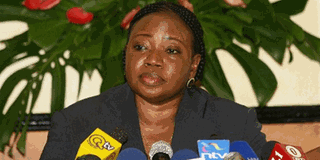Politics dogs Bensouda visit

International Criminal Court Chief Prosecutor Fatou Bensouda addressing the press at Serena Hotel in Nairobi on October 25, 2012 shortly after she arrived from Nakuru where she met with victims of the 2007-2008 post-election violence. Photo/BILLY MUTAI
What you need to know:
- ICC prosecutor stresses that court is apolitical and not targeting any ethnic group or party
Politics was at the forefront on Friday as International Criminal Court chief prosecutor Fatou Bensouda met post-election violence victims in Uasin Gishu County.
While some of the 2007/08 violence victims wanted the cases to continue, some felt they would jeopardise peace and reconciliation efforts.
Mr Joseph Githuku, who lost his wife and child when the Kenya Assemblies of God Kiambaa church was burnt down, said he was confident justice would be done.
“We are happy you have come to see the graves of people who died in the chaos. We have faith in you and hope the truth will come out,” said Mr Githuku.
Ms Regina Muthoni, whose disabled mother died in the church fire, accused the government of ignoring the plight of the victims.
“The government has not done anything for the victims. My mother died and the only evidence we saw of her was her burnt wheelchair. I now take care of the family,” she said.
Ms Bensouda said at the church site that she was curious to know the exact number of people who perished there as there were conflicting reports. “I hear of 17, 40 people. How many died here?” Ms Bensouda asked.
Mr Githuku said the number of was not clear but confirmed that 36 bodies were buried there. He said two others were identified and taken to Central Province for burial.
Some victims said the four Kenyans facing charges were sacrificial lambs as the violence was spontaneous.
Ms Mercy Kariuki, who was displaced from Nandi County, cast doubts on the investigations, saying those who bore the brunt of the chaos were not witnesses at the ICC.
She said affected communities were not involved in identifying witnesses and former chief prosecutor Luis Moreno-Ocampo only relied on the Waki report and civil society.
“Even those who presented their views before the Waki and Kriegler commissions were selectively identified. Some of us were chased away and we are not convinced the evidence was sourced properly,” said Ms Kariuki.
Responding to the concerns in Burnt Forest, Eldoret East District, Ms Bensouda said it was impossible for locals to tell whether their people were witnesses.
“Everywhere I am told witnesses were not drawn from these areas. We may have witnesses from a particular community but we can’t reveal where they come from,” she said, adding the court must protect the identities of witnesses.
She stressed that the court was not political and was not targeting anyone. “The ICC is not against any ethnic group, political party, government or people of Kenya. It is all about individuals who bear the greatest responsibility,” Ms Bensouda said.
She said the cases were based on evidence from affected areas.
“I don’t want anybody to believe the case before the ICC is based on tribal considerations. We are not here because of politics but to seek justice,” she said.




